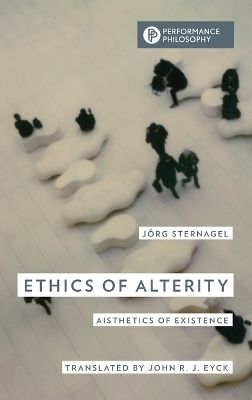
Ethics of Alterity
Aisthetics of Existence
Seiten
2023
Rowman & Littlefield (Verlag)
978-1-5381-7840-9 (ISBN)
Rowman & Littlefield (Verlag)
978-1-5381-7840-9 (ISBN)
This book puts into writing how alterity not only can be treated theoretically but also can be made accessible through writing as well as rendered relatable through reading. That is why it deals with exemplary interpersonal encounters in the world, in the arts, and in the media.
Providing a solid media-philosophical groundwork, the book contributes to the theory of alterity in Performance Philosophy, while stimulating and inspiring future inquiries where studies in media, art, and literature intersect with philosophy. It collects a selective as well as productive diversity of philosophical, literary, and artistic figures of thought, attaining an exacting framework as a result of a clearly elaborated ethics of alterity, innovatively opened up by way of an aisthetics of existence: Touching upon the Aristotelian concept of aisthesis, the material, perceptual and sensory dimensions of everyday bodily existence are highlighted to move beyond what aesthetics in Modern Philosophy just specializes in, namely art and the beautiful. The notion of existence is therefore borrowed from Maurice Merleau-Ponty, who understands it as something concrete and richly interrelated, so as to avoid the dualisms both of psychological processes of consciousness and of physiological mechanisms. It is thus made explicit such that the unity of body and soul is not any arbitrarily arranged connection between “subject” and “object” but, rather, that it is enacted at every instant in the movement of existence. Imaginatively then, the book puts into writing how alterity not only can be treated theoretically but can be also made accessible through writing as well as rendered relatable through reading. That is why it deals with exemplary interpersonal encounters in the lifeworld, in the arts, and in the media, which are initially thematized as intercorporeal experiences, so as to enable an approach for an ethics of alterity by way of, in particular, sites located within a phenomenology of perception oriented towards the lived body.
Providing a solid media-philosophical groundwork, the book contributes to the theory of alterity in Performance Philosophy, while stimulating and inspiring future inquiries where studies in media, art, and literature intersect with philosophy. It collects a selective as well as productive diversity of philosophical, literary, and artistic figures of thought, attaining an exacting framework as a result of a clearly elaborated ethics of alterity, innovatively opened up by way of an aisthetics of existence: Touching upon the Aristotelian concept of aisthesis, the material, perceptual and sensory dimensions of everyday bodily existence are highlighted to move beyond what aesthetics in Modern Philosophy just specializes in, namely art and the beautiful. The notion of existence is therefore borrowed from Maurice Merleau-Ponty, who understands it as something concrete and richly interrelated, so as to avoid the dualisms both of psychological processes of consciousness and of physiological mechanisms. It is thus made explicit such that the unity of body and soul is not any arbitrarily arranged connection between “subject” and “object” but, rather, that it is enacted at every instant in the movement of existence. Imaginatively then, the book puts into writing how alterity not only can be treated theoretically but can be also made accessible through writing as well as rendered relatable through reading. That is why it deals with exemplary interpersonal encounters in the lifeworld, in the arts, and in the media, which are initially thematized as intercorporeal experiences, so as to enable an approach for an ethics of alterity by way of, in particular, sites located within a phenomenology of perception oriented towards the lived body.
Jörg Sternagel is a scholar in media studies with a focus on media philosophy at the University of Passau and the University of Konstanz.
Acknowledgements
Introduction
Chapter One: An Opening In the Openness
Chapter Two: Being Visible, Rendering Visible, and Being Invisible
Chapter Three: Prosthethics
Chapter Four: Face, Mask, and Visage
Chapter Five: Responsivity of the Lived Body
Chapter Six: Moments of the Ethical
Chapter Seven: Pathology of the Lived Body
Chapter Eight: Aesthetics of L’écriture Féminine
Chapter Nine: The Event of Hospitality
Chapter Ten: Vita Communis
Chapter Eleven: Ethics of Ethics
Notes
Bibliography
Index
About the Author
| Erscheinungsdatum | 05.04.2023 |
|---|---|
| Übersetzer | John R. J. Eyck |
| Vorwort | Tony McCaffrey |
| Verlagsort | Lanham, MD |
| Sprache | englisch |
| Maße | 161 x 230 mm |
| Gewicht | 540 g |
| Themenwelt | Kunst / Musik / Theater ► Theater / Ballett |
| Geisteswissenschaften ► Philosophie ► Philosophie der Neuzeit | |
| ISBN-10 | 1-5381-7840-0 / 1538178400 |
| ISBN-13 | 978-1-5381-7840-9 / 9781538178409 |
| Zustand | Neuware |
| Informationen gemäß Produktsicherheitsverordnung (GPSR) | |
| Haben Sie eine Frage zum Produkt? |
Mehr entdecken
aus dem Bereich
aus dem Bereich


